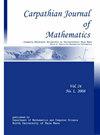参数边界条件下(p,q,r)-拉普拉斯算子的特征值
IF 1.1
4区 数学
Q1 MATHEMATICS
引用次数: 0
摘要
“考虑在有界域$\Omega\subet\mathbb{R}^N$,$N\ge 2$中,具有光滑边界$\partial \Omega$的下列非线性特征值问题\beart{方程*}\left\{\beart}{l}-\sum_{\alpha\in\{p,q,R}}\rho_{\aalpha}\Delta_^{r-2}u\\\mbox{in}~\Omega,\\[1mm]\big^{r-2}u~\ mbox{on}~\ partial \ Omega,\ end{array}\ right。\end{方程*},其中$p,q,r\in(1,+\infty),~q0.$这样的三相问题是由数学物理中出现的一些模型引起的。如果$r\not\in(q,p),$,我们确定一个正数$\lambda_r$,使得上述问题的特征值集恰好是$\{0\}\cup(\lambda_r,+\infty)$。另一方面,在具有$r"Eigenvalues of the (p, q, r)-Laplacian with a parametric boundary condition"
"Consider in a bounded domain $\Omega \subset \mathbb{R}^N$, $N\ge 2$, with smooth boundary $\partial \Omega$ the following nonlinear eigenvalue problem \begin{equation*} \left\{\begin{array}{l} -\sum_{\alpha \in \{ p,q,r\}}\rho_{\alpha}\Delta_{\alpha}u=\lambda a(x) \mid u\mid ^{r-2}u\ \ \mbox{ in} ~ \Omega,\\[1mm] \big(\sum_{\alpha \in \{p,q,r\}}\rho_{\alpha}\mid \nabla u\mid ^{\alpha-2}\big)\frac{\partial u}{\partial\nu}=\lambda b(x) \mid u\mid ^{r-2}u ~ \mbox{ on} ~ \partial \Omega, \end{array}\right. \end{equation*} where $p, q, r\in (1, +\infty),~q0.$ Such a triple-phase problem is motivated by some models arising in mathematical physics. If $r \not\in (q, p),$ we determine a positive number $\lambda_r$ such that the set of eigenvalues of the above problem is precisely $\{ 0\} \cup (\lambda_r, +\infty )$. On the other hand, in the complementary case $r \in (q, p)$ with $r < q(N-1)/(N-q)$ if $q
求助全文
通过发布文献求助,成功后即可免费获取论文全文。
去求助
来源期刊

Carpathian Journal of Mathematics
MATHEMATICS, APPLIED-MATHEMATICS
CiteScore
2.40
自引率
7.10%
发文量
21
审稿时长
>12 weeks
期刊介绍:
Carpathian Journal of Mathematics publishes high quality original research papers and survey articles in all areas of pure and applied mathematics. It will also occasionally publish, as special issues, proceedings of international conferences, generally (co)-organized by the Department of Mathematics and Computer Science, North University Center at Baia Mare. There is no fee for the published papers but the journal offers an Open Access Option to interested contributors.
 求助内容:
求助内容: 应助结果提醒方式:
应助结果提醒方式:


